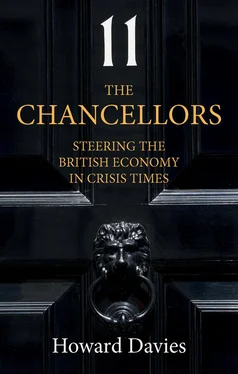There was no sign that the relative productivity improvement was running out of steam in 1997, so in that sense Labour’s inheritance was a good one. The economy was expanding, and for some time had been the fastest growing in the G7.
That record was sustained over the whole period from 1997 to 2010. Even though there was a sharp recession precipitated by the financial crisis, as Dan Corry et al. conclude, ‘relative to other major industrialised countries, the UK’s performance was good after 1997’. 3Growth in GDP per head averaged what might by historical standards appear a fairly modest 1.42% a year over the thirteen-year period. But that was faster than in any of the other comparable large economies. Germany grew by 1.26% a year, the US by 1.22%, France by 1.04%, Japan by 0.52% and Italy by a remarkably weak 0.22%.
With the exception of Italy and Japan, the differentials are not great, but sustained over more than a decade they become significant. There was certainly an element of catch-up at work. Poor economic governance leading to high inflation, an underperforming education sector, weak industrial management and bad industrial relations resulted in the UK slipping back against comparable countries during the 1950s, 1960s and 1970s. The German Wirtschaftswunder and the Trente Glorieuses in France passed us by. So once the shackles of poor labour relations and weak competitive dynamics were thrown off, some convergence was to be expected. But Corry et al. reject the argument that growth in the Brown and Darling years was driven mainly by the momentum created by their predecessors.
Some maintain that much of this outperformance was in a sense illusory, and that the productivity improvement was driven by unsustainable bubbles in the financial and property sectors in particular. But the financial sector contributed only 0.4% of the 2.8% annual growth in the market economy and productivity improvements were primarily driven by business services and distribution, through the utilization of new skills and technologies. Financial intermediation accounted for around 6% of gross value added (GVA) throughout the period from 1979 to 2010, only slightly higher than the French figure (5%). Property activity did grow, but from 5 to 8% of GVA. The biggest improvements in productivity are traceable to changes in the composition of the labour force, in other words a higher proportion of workers with higher-level skills, and greater use of information and communication technologies (ICT), which was an important differentiating factor for both the UK and the US vis-à-vis the large European economies. The UK was also more successful than others in attracting inward investment, and foreign-owned firms have long shown higher productivity than their domestic counterparts.
How much credit can the Blair and Brown governments take for this outperformance?
A neutral to negative interpretation might be that they did not reverse the earlier Conservative labour market reforms, and did not revert to a policy of nationalization and support for ailing industries. But there are also positive points. Labour support for ‘neoclassical endogenous growth theory’, which earned Brown ridicule when he included it in a political speech (in Michael Heseltine’s words ‘it wasn’t Brown, it was Balls’), did carry through into government. They overhauled competition policy through the 1998 Competition Act and the Enterprise Act of 2002, which gave the Competition Commission stronger powers. International comparisons of competition enforcement now typically score the UK highly.
Labour also prioritized expansion of university education. The proportion of the workforce with a university degree rose more sharply in the UK than elsewhere, from less than a quarter in 1997 to more than a third by 2010. There is room for doubt about whether holding a degree in media studies is a robust proxy for higher workplace skills, and vocational and further education have remained weak areas, but the additional investment in higher education has overall been positive.
It is also likely that tax credits introduced in 2001 and 2003 helped to arrest the decline in Research and Development (R&D) expenditure, which had been a feature of the UK economy since the late 1970s, and there is a strong case for saying that the regulatory changes introduced under Labour, especially in telecommunications, had a positive impact.
There were, however, three negative features, which have become persistent and worrying. The first is that British management scores poorly in international comparisons, well below the US, Japan and Germany. 4There was a modest improvement in the later years but not enough to change the overall picture. Second, regional differences in GVA and productivity are greater than elsewhere. In Europe the UK is second only to Ireland in the degree of regional inequality. London is far more productive and wealthier than other cities, partly because of the City’s remarkable success in establishing and maintaining its position as the largest financial centre in Europe, even outside the Eurozone. London as a global city has grown apart from its hinterland in terms of growth, productivity and social and political attitudes. That growing inequality seems to have been a factor in the Brexit vote, and also in the 2019 election. Third, the performance of the public sector was weak. Measuring output and productivity in the public services is not straightforward, but Corry et al. conclude as follows: ‘UK output growth in the non-market sectors was greater in the Labour period than under the Conservatives, but labour productivity growth fell from 0.6% to zero … this is consistent with the story that the large increase in public services expenditures led to a fall in productivity in these sectors.’
Nonetheless, the record of the first decade of Labour, with Brown as Chancellor, was quite strong. The economy was the fastest growing in the G7, with rising productivity, high inward investment (though investment was not high overall) and relatively low unemployment by international standards. Also, while the UK share of exports of goods continued to decline, its share of world services exports rose and remained second only to the US.
The UK economy had grown consistently since the spring of 1992: there were 64 consecutive quarters of growth until the second quarter of 2009. That relentless expansion contributed to the psychology of optimism which lay behind the financial market excesses. The global financial crisis (GFC), which began in the summer of 2007, but hit the real economy hardest in 2009, brought this steady progress to a crashing halt.
As we shall see in Chapter 7, Osborne mounted an argument, in opposition and then in government, to the effect that Labour was responsible for the crisis because of the change in regulatory structure introduced in 1997–8, and because of its encouragement of light-touch regulation. Given the global nature of the problems revealed, that does not seem plausible.
But there is a separate point: the crisis may have hit the UK economy harder, and led to more persistent weakness, because of the large increase in public spending after 2000. We discuss the public spending and taxation profile through the period in more detail in Chapters 3and 4. The particular argument here is that the government’s fiscal position was out of balance when the crisis hit. As Corry et al. put it: ‘In retrospect, it is clear that public debt levels were too high for the stage of the cycle in 2008 … [and] the debt position exacerbated the pain of recession.’ Nicholas Sowels argues that the pre-crisis deficits broke the government’s own fiscal rules, which ‘in turn prepared the way for a substantial deterioration in public finances when the crisis broke, a deterioration which may take years, if not decades, to set right’. 5By contrast, Jonathan Portes points out that the structural deficit was only around 1% of GDP. 6That jumped to 5% over the next two years, but the ‘poor state of the public finances was a consequence of the recession, not a cause of it’.
Читать дальше









